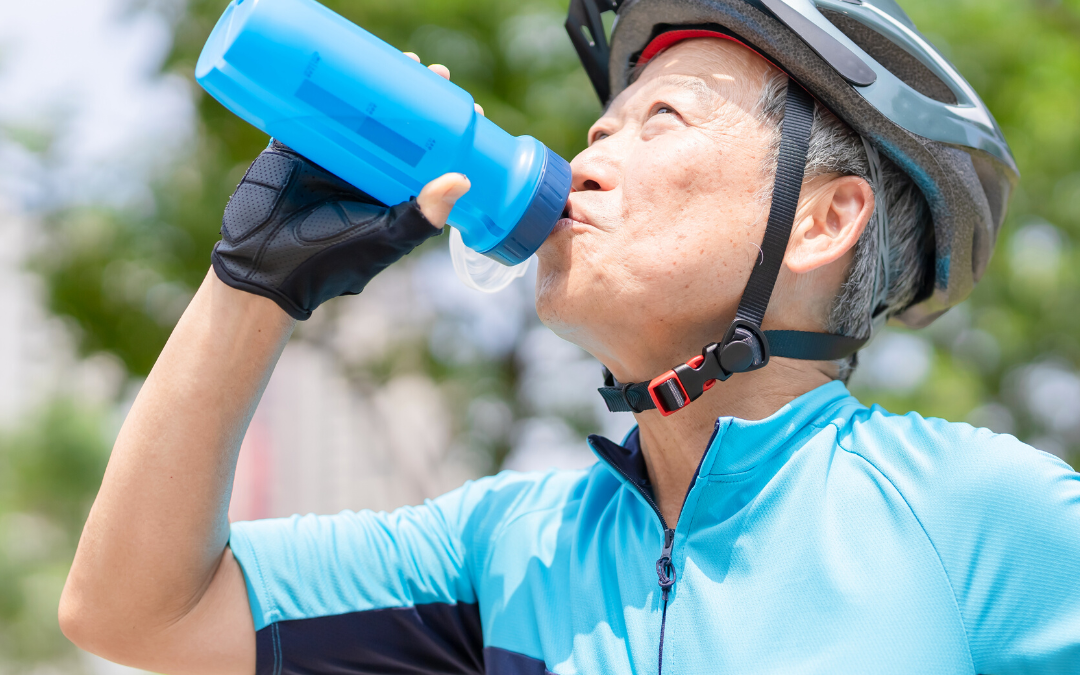Dehydration is a major, yet often times overlooked health concern when it comes to seniors. In this post we will look at different ways seniors can prevent dehydration.
When we do not drink enough water, it depletes our bodies of electrolytes, as well as other important nutrients. Intense dehydration can cause serious health issues and even lead to death. This is a serious issue in the senior community. The older we get, the more susceptible our bodies are to dehydration.

Our bodies are made up of about 70% water depending on your age and gender. Under normal conditions our body loses some water through sweat, urine, tears, as well as bowel movements. “Water serves many functions in our bodies like lubricating our joints and pumping blood to our heart.” This is why staying hydrated is an important part of maintaining a healthy body no matter your age.
According to The National Counsel On Aging: “Dehydration is a potentially serious condition that can occur when you don’t consume enough fluids for your body’s needs. This can lead to health complications ranging from mild to life-threatening, such as urinary tract infections (UTIs), heat stroke, heart problems, kidney failure, and blood clot complications. Since dehydration affects the health of your cells, it can also lower your body’s ability to ward off infections and heal from injury or illness.” {Information Source: https://www.ncoa.org}
As we age, our sense of thirst and our appetite tend to decrease. When this happens we may not be aware that we are thirsty or hungry and because of this diminished sense of thirst/hunger, many seniors become dehydrated. Older adults also experience a lot of body composition changes as they age, and this usually leaves them with less water in their bodies. For seniors, with age also comes different health issues. These issues cause them to take medication, which can also increase their risk of dehydration.
Resent studies have found that the bodies of older adults are not able to regulate “body temperature” as accurately as someone belonging to a younger age group. 1 This means that during exercise or activity, seniors are more likely to become dehydrated through sweating.
If severe dehydration goes unchecked, it can cause seizures due to electrolyte imbalance, a reduction in the volume of blood in the body (hypovolemic shock), kidney failure, heat injuries, and even coma or death. {informaition source: https://www.agingcare.com)

If you know what to look for, you can spot dehydration. Signs of dehydration can include: feeling dizzy/lightheaded, headaches, dry mouth/lips/eyes/skin, feeling tired, dark yellow urine, smelly urine, rapid breathing & heartbeat, a weak pulse and cold hands/feet. Low blood pressure and disorientation are also signs of dehydration.
Now that you know how to spot dehydration, here are a few ways you can help your aging parent/grandparent prevent dehydration:
- Try to reduce or eliminate the amount of coffee, soda and tea they are drinking. These drinks contain high amounts of caffeine and can cause dehydration if consumed regularly.
- Make sure that they are drinking the recommended amount of water daily to hydrate their bodies properly. Consulting with their doctor is also a great way to find out how much water they need daily based on their medical history and body needs.
- It is also advised that seniors include lots of raw fruits and veggies in their daily diet. Fruits and vegetables contain high percentages of water and can help increase their water intake.
- Chicken and beef broth is also a great source of fluids especially in the colder months.
- If your senior does not like the taste of plain water, you can get creative and add in a piece of lemon or other fruit for a nice flavor.

Dehydration can be prevented in several ways, one of which is to keep the body cool and avoid over heated temperatures. Another way you can help your aging loved one is by making sure they have a nutrition plan that includes lots of nutrient rich foods and fluids. Help them stay hydrated by drinking enough water and remember that there are many foods that can count toward their daily water intake. If your loved one is taking part in an activity or event, make sure they have enough liquids to keep them hydrated and have them take short breaks in between activities. Make drinking water at set periods throughout the day a part of their routine and be sure to check in with their doctor regularly.
Sources
1. Meade, Robert D. et al. Aging attenuates the effect of extracellular hyperosmolality on whole-body heat exchange during exercise-heat stress, J Physiology,2020;598(22):5133-5148.

